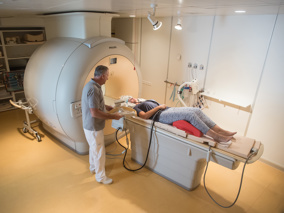Meninges - metastases
Tumors that metastasize to the cerebrospinal fluid or spinal fluid are also called leptomeningeal metastases. This is a fairly rare type of metastasis. It is most common in patients with breast cancer, lung cancer , and malignant skin cancer (melanoma). Usually the tumor cells spread through the blood to the cerebrospinal fluid or spinal fluid.
More information about metastases to the meninges
Causes of metastases to the meninges
Sometimes the treatment for metastases in other places in the body, such as chemotherapy, does not work well in the meninges. This is because the chemotherapy does not penetrate the meninges properly. As a result, the tumor cells can still metastasize to the meninges. They can also be caused by tumor cells spreading during surgery for metastasis in the brain.
Symptoms of metastases to the meninges
Symptoms of metastases in the meninges are:
- Headache
- Confusion
- Nausea and vomiting
- Impaired vision or speech
- Pain in the arms or legs
- Shaky walking
- Urine leakage
Research & diagnosis
In order to be able to diagnose metastases to the meninges, various tests are possible. Your doctor will discuss with you which diagnostic tests are needed.
Waiting
We want to inform you as well as possible about the waiting time per condition. We do this based on a prognosis of the current waiting list. The waiting time can vary from patient to patient for various reasons. Your attending physician will give you more information during your outpatient consultation.
-
4 days
First appointment
This is approximately how long it will take until you have your first appointment
-
14 days
Surgery
We aim to remove malignant tumors within 14 days.
-
4 days
Second opinion
This is approximately how long it will take before you come in for a second opinion at the NKI
 nl
nl



